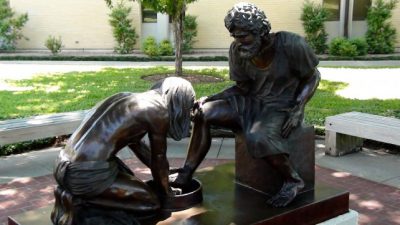Liturgical Readings for : Wednesday, 6th November, 2024
FIRST READING
A reading from the letter to the Hebrews 11:2, 12:1-4, 15, 13:1
Let us not lose sight of Jesus, who leads us in our faith and brings it to perfection.

It was for faith that our ancestors were commended. With so many witnesses in a great cloud on every side of us, we too, then, should throw off everything that hinders us, especially the sin that clings so easily, and keep running steadily in the race we have started.
Let us not lose sight of Jesus, who leads us in our faith and brings it to perfection:
for the sake of the joy which was still in the future, he endured the cross, disregarding the shamefulness of it, and from now on has taken his place at the right of God’s throne.
Think of the way he stood such opposition from sinners and then you will not give up for want of courage. In the fight against sin, you have not yet had to keep fighting to the point of death.
Be careful that no one is deprived of the grace of God and that no root of bitterness should begin to grow and make trouble; this can poison a whole community. Continue to love each other like brothers, and remember always to welcome strangers, for by doing this, some people have entertained angels without knowing it.
The Word of the Lord. Thanks be to God.
_______________________________________
Alternative FIRST READING
A reading from the Book of Ecclesiasticus 44:1-15
Their name lives on for all generations.

Let us praise illustrious men, our ancestors in their successive generations.
The Lord has created an abundance of glory, and displayed his greatness from earliest times.
Some wielded authority as kings and were renowned for their strength;
others were intelligent advisers and uttered prophetic oracles.
Others directed the people by their advice, by their understanding of the popular mind,
and by the wise words of their teaching; others composed musical melodies, and set down ballads;
others were rich and powerful, living peacefully in their homes.
All these were honoured by their contemporaries, and were the glory of their day.
Some of them left a name behind them, so that their praises are still sung.
While others have left no memory, and disappeared as though they had not existed,
they are now as though they had never been, and so too, their children after them.
Here is a list of generous men whose good works have not been forgotten. In their descendants there remains a rich inheritance born of them. Their descendants stand by the covenants and, thanks to them, so do their children’s children.
Their offspring will last for ever, their glory will not fade.
Their bodies have been buried in peace, and their name lives on for all generations.
The peoples will proclaim their wisdom, the assembly will celebrate their praises.
The Word of the Lord. Thanks be to God.
______________________
Responsorial Psalm Ps 125: Rv 5
Response Happy the man who has placed his trust in the Lord.

1.Those who put their trust in the Lord are like Mount Sion,
that cannot be shaken, that stands for ever. Response
2. Jerusalem! The mountains surround her,
so the Lord surrounds his people both now and for ever. Response
3. For the sceptre of the wicked shall not rest over the land of the just
for fear that the hands of the just should turn to evil. Response
4. Do good, Lord, to those who are good, to the upright of heart;
but the crooked and those who do evil, drive them away!
On Israel, peace! Response
Gospel Acclamation Mt 11: 28
Alleluia, alleluia!
Come to me, all you who labour and are overburdened, and I will give you rest, says the Lord.
Alleluia.
GOSPEL
The Lord be with you. And with your spirit
A reading from the holy Gospel according to Luke 6: 20-26 Glory to you, O Lord.
Rejoice when that day comes, your reward will be great in heaven

Fixing his eyes on his disciples Jesus said:
‘How happy are you who are poor: yours is the kingdom of God.
Happy you who are hungry now: you shall be satisfied.
Happy you who weep now: you shall laugh.
‘Happy are you when people hate you, drive you out, abuse you, denounce your name as criminal, on account of the Son of Man.
Rejoice when that day comes and dance for joy, for then your reward will be great in heaven.
The Gospel of the Lord. Praise to you, Lord Jesus Christ.
********************
Gospel Reflection All the Saints of Ireland Luke 6:20-26

The gospel reading for this feast of all the saints of Ireland is the beatitudes as found in the gospel of Luke. They are less familiar to us that the beatitudes as found in Matthew, and, perhaps, more difficult to come to terms with. In what sense are the poor, the hungry, the weeping, the persecuted, happy or blessed? They are happy because, according to Jesus, God is close to them and is working to reverse their miserable situation, ‘yours is the kingdom of God… you shall be satisfied… you shall laugh… your reward will be great in heaven’. Is it the case then that they should accept their plight in the hope that all will be well in the next life? Jesus’ words and actions in this gospel of Luke as a whole would not suggest so.
In the parable of the rich man and Lazarus, Lazarus is certainly poor, hungry and weeping. He had no one who tried to improve his situation, even though the rich man on the other side of the gate could have transformed his miserable state with just a little effort. Beyond death, God not only improved his situation, but completely reversed it. At the banquet of Abraham, he enjoyed the hospitality of the kingdom of God; he was satisfied and joyful. Yet, the clear message of the parable is that Lazarus should not have had to wait until after his death for his situation to be reversed. God wanted and expected the rich man to begin to do for Lazarus what God did for him in the kingdom of God.
Luke’s gospel as a whole is clear that God wants the work of reversing the situation of the most vulnerable to begin in the here and now. Throughout his ministry, Jesus powerfully revealed this hospitable, transformative, love of God to those who found themselves living on the margins. He looks to his disciples to do the same. The saints were those through whom God’s hospitable, welcoming, love began to transform the lives of those in greatest need. Because of their lives, the kingdom of God was not just a future hope but was also something of a present reality for those who longed for its coming.
______________
The Scripture Readings are taken from The Jerusalem Bible, published 1966 by Darton, Longman & Todd Ltd.











